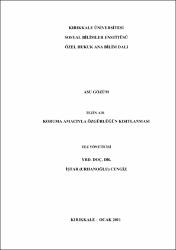Koruma amacıyla özgürlüğün kısıtlanması
Özet
İnsan hakları, herkesin kişiliğine bağlı, doğuştan sahip olunan, dokunulamaz, devredilemez, vazgeçilemez temel hak ve hürriyetlerdendir. Bu hak ve özgürlükler ancak belirli bazı şartlar altında sınırlanabilecektir. Buna göre şekil ve şartları kanunda gösterilen durumlar dışında kimse özgürlüğünden alıkonulamayacaktır. 4721 sayılı Türk Medeni Kanunu 335-494. maddeleri arasında velayet ve vesayet kurumları düzenlenmiştir. Buna göre genel olarak her çocuk, anne ve babasının velayeti altında olmak zorundadır. Gerek görülen hallerde ise kişinin tüm menfaatlerini korumak ve onu hukuki işlemlerde temsil etmek üzere bir vasi atanabilir. Ayrıca yeni Medeni Kanun ile vesayet hukuku bakımından yeni bir kurum olarak 432-437. maddeler arasında koruma amacıyla özgürlüğün kısıtlanması müessesesi getirilmiştir. Koruma amacıyla özgürlüğün kısıtlanmasının amacı, adından da anlaşılacağı üzere ruhsal veya bedensel hastalıkları nedeni ile toplum için tehlike oluşturan ve korunmaları başka şekilde sağlanamayan kişilerin tedavileri, eğitimleri veya ıslahları için elverişli bir kuruma yerleştirilmelerini sağlamaktır. Kısıtlama sebepleri 432. maddede sınırlı olarak sayılmıştır. Bunlar; akıl hastalığı, akıl zayıflığı, alkol ve uyuşturucu madde bağımlılığı, ağır tehlike arz eden bulaşıcı hastalık veya serserilik halleridir. Burada Anayasal temel bir hakkın sınırlandırılması söz konusu olduğu için bu sebeplerden başka her hangi bir sebeple bir kimsenin özgürlüğü koruma amacıyla sınırlandırılamayacaktır.Özgürlüğü kısıtlanan kişinin tedavi, eğitim ve ıslahı için elverişli bir kuruma yerleştirileceği veya alıkonulacağı öngörüldüğü için söz konusu kurumun bu amaca uygun olması gerekmektedir. Ancak ülkemizde bu kurumların varlığı tartışılmaktadır. Koruma amacıyla özgürlüğün kısıtlanması müessesinin tam olarak uygulanabilmesi için öncelikle yeterli uzman personele sahip kurumların açılıp faaliyete geçirilmesi gerektiği kanaatindeyim. Human Rights as one of the basic rights and liberties are possessed by the birth, unalienable, indefeasible and dependent to the personality of each person. These rights and liberty can only be restricted under some certain conditions. According to this nobody can be detained from his freedom unless under the conditions described in the law. The guardian and ward institutions are established according to the articles 335-494 of the Turkish Civil Code numbered 4721 for this purpose.Generally all kids under the age of eighteen are under the custody of the mother and father. In case of necessity a guardian can be appointed for the person in order to protect the benefits and represent for the legal transactions. In addition the institution of restriction of the freedom has been introduced as a new institution for the law of custody under the new Civil Code articles 432-437.The aim to restrict the freedom for protection as it will be understood from the name is to accommodate the persons who are threatening the community due to their mental or physical illnesses and there is no other way to protect such persons, into an institution sufficient for their cure, education and correction. The reasons for restriction are laid down limited in the article 432. These are mental illness, weakness of mind, addiction of alcohol and drugs, infectious disease causing severe danger or vagabondism. The subject here is to restrict a basic constitutional right; therefore to restrict the freedom for protection of somebody for any other reason is not possible.The person whose freedom is restricted will be accommodated to an institution sufficient for his cure, education and correction; therefore this institution should be satisfying such needs. Unfortunately the existence of such institutions in our Country is under discussion. I am in the opinion that the proper enforcement of the institution of restriction of freedom for protection is depending on the existence of the institutions under operation with sufficient number of specialists.
















